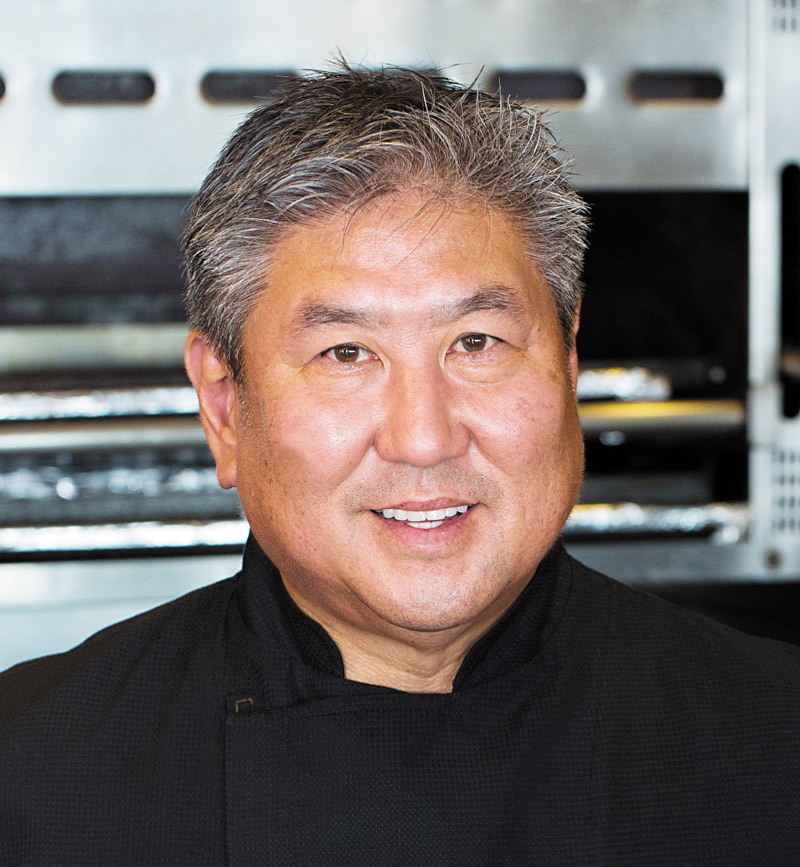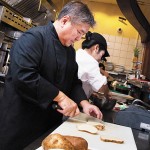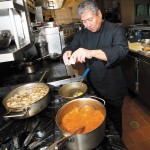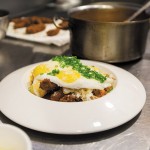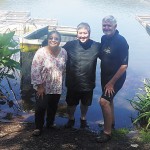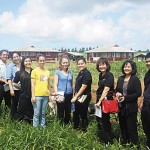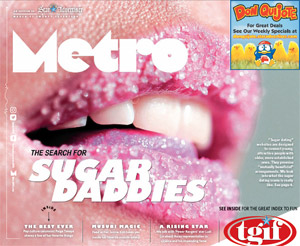Alan Wong
I’ve always been terrified of Alan Wong.
His is a name you sort of say softly in reverent awe, you know?
The man is credited as one of the pioneers of Hawaii Regional Cuisine. He received a James Beard Award in 1996 for Best Chef of the Year, Pacific Northwest. Alan Wong’s Honolulu consistently and continuously receives honors from local and national publications. Even the President of the United States makes it a point to stop in at Wong’s restaurant when he’s in town.
Seriously — and all of that just barely scratches the surface.
So when he agreed to meet with me for this story, I was a little … Well, nervous is a gross understatement.
I’d spoken to him once before, but only over the phone. He was totally down to earth, putting to rest my nerves with a demeanor that made me feel as though I were talking to an uncle. (At one point after discovering I am from Mililani, he proudly pointed out that he grew up in nearby Wahiawa.)
But I am an entirely different animal in person — awkward, a bundle of nerves, so awkward. Still, as someone who is fascinated by food and the people who make it, I felt compelled to know more about Wong than just what I see on a plate.
- Wong preps potatoes to be fried for a breakfast dish
- Wong cooking at his King Street restaurant, which celebrates its 20th anniversary this year. PHOTO BY ANTHONY CONSILLIO
- Wong’s sunny-side-up eggs over fried potatoes and Portuguese bean soup
Unsurprisingly, he’s completely normal. So much so that even he eats fast food from time to time.
I was originally to join Wong and his team on a tour of Kualoa Ranch, but poor weather conditions unexpectedly canceled those plans.
It’s a shame, really. It would have been a real treat to see Wong in his element, given his walk-the-talk approach to supporting local. You’ve probably heard or read about Wong encouraging others to buy local or think sustainably.
In 2011, for example, he teamed up with University of Hawaii-Hilo to establish Adopt-a-Beehive with Alan Wong. It’s a program that seeks to raise awareness on the plight of honeybees — only one of a number of growing issues in our ecosystem, really. When I had first talked to him months ago for another story, Wong explained that sustainability is what his company is all about — fostering this belief within the community, after all, ultimately ensures everyone in Hawaii wins.
So it makes sense, in many ways, why Wong would see touring farms as such an integral aspect of his role as a chef, and in many instances, he brings along a group of his staff as well. Building new relationships with farmers and maintaining old ones and seeing exactly where produce is grown doesn’t only benefit Wong. If those working for him have a deeper understanding of food that is served, so will diners.
“A waiter — he can tell, from firsthand experience, a small little thing about his experience of being on the farm,” he says. “That makes a difference in telling a story.”
- Wong with Lita and Ron Weidenbach, who own North Shore Aquafarm PHOTO COURTESY ALAN WONG’S RESTAURANTS
- Wong and his staff during a visit of Sweet Land Farm: (from left) Wong, Mark Shishido, Miya Nishimura, Monica Nakasone, Sweet Land Farm owner Emma Bello, Jill Briney, Nicole Ng, Leigh Ito, Kathy Kawashige and James Aung PHOTO COURTESY ALAN WONG’S RESTAURANTS
This hands-on approach to teaching has been important to Wong since the day he opened Alan Wong’s Honolulu in 1995.
He has served as an instructor at Kapiolani Community College (also his alma mater), where he helped to establish the school’s culinary program. And he continues to support the education of others, for instance, through his Feeding Leaders Program, which provides college tuition reimbursement for employees who study a topic related to their job at his restaurant.
It extends to his travels, too, when Wong is a guest chef — locally, nationally, internationally — or when he goes out to a restaurant. Wong seems to care deeply about giving those around him the same firsthand knowledge he gains in that moment.
“They’re actually experiencing what I’m eating, what I’m seeing, what I’m feeling,” he says. “We’re experiencing that. It’s very important for them to see that.”
Sharing, it seems, is just part of his nature.
I ask if there is one story that stands out that he likes to tell people. He points to Obama’s visits as one, also noting that he and a group of about 14 also had the opportunity to cook for the president’s White House Congressional picnic. But even that conversation becomes less about him and more of a revealing look at how selfless he must be.
“He comes every year and it’s not like it gets old,” Wong says. “But I look around and I look at all the new people who have never experienced that before, and I see how excited they are.”
As I sat there listening to Wong, I felt inspired. So inspired that I briefly, very briefly, wondered if I am too old to switch professions for even just a chance to train under him.
It’s a greatness I sense from him that I’m sure he’d scoff and laugh at if I were to tell him that. But it must be true. This year, for instance, Alan Wong’s Honolulu celebrates its 20th anniversary and yet, when the topic comes up, I receive a very simple — almost predictably humble — response.
“You got to be consistent all the way around — food, beverage and service,” he says. “You got to make the people feel like this is a special occasion.
“Throughout the 20 years, there have been many people that came and some are gone — some are still here,” he adds. “I think I’ve been blessed to have been with so many great individuals that have helped shape who we are.”
Really, then, it comes down to Wong’s finesse as a leader, a role he seems to have been naturally drawn to. (He previously had envisioned a career in baseball for himself but when he got “too old to play,” he jokes, his thoughts shifted to coaching. In an industry as busy as this one, he turned to teaching instead.)
And so one thing became very apparent: Wong isn’t just a chef. He is a teacher, leader, savvy entrepreneur — and he is very, very precise. (In a way that makes me imagine he’s one of those rare gems of a teacher who probably doles out tough love, but makes you realize you’d never learned more in your life.)
When I ask him what it means to be a great chef, he says as much.
“You have to be a good cook, you have to know what you’re doing. It’s very technical,” he says. “But today, you have to wear so many hats.”
The obvious “hat,” he explains, is as a chef whose food people like.
It also entails knowing how to talk to people, how to relate to them.
Another requires an understanding of PR and social media, something he seems to fully grasp. For more than 10 years now, Wong has been taking his own photos of dishes for promotional materials. Everyone these days, he acknowledges, is taking photos of their food. So when he trains cooks, he tells them to look at their plates as though they were seeing it through a camera lens.
“What you see in those four corners, that’s what the customer sees,” he says. “You become more aware of what you’re actually shooting and you gotta be in the moment — you can’t be thinking about before, you can’t be thinking about ahead.
“And today with digital, it’s so easy,” he adds with a laugh. “You don’t have to back up your film and take it to Longs Drugs.”
The last “hat” he describes is perhaps the largest. It involves being aware of what’s going on in the world. It isn’t just the honeybees, after all. There are GMOs and global warming, too.
“It has nothing to do with being a chef, but it could,” he says. “It could, depending on who you choose to buy from, what you choose to support.
“You can make a difference as a chef today, as a restaurant.”
And that is how, in one afternoon, sitting across the table from chef Alan Wong, I decided we just had to become best friends.

